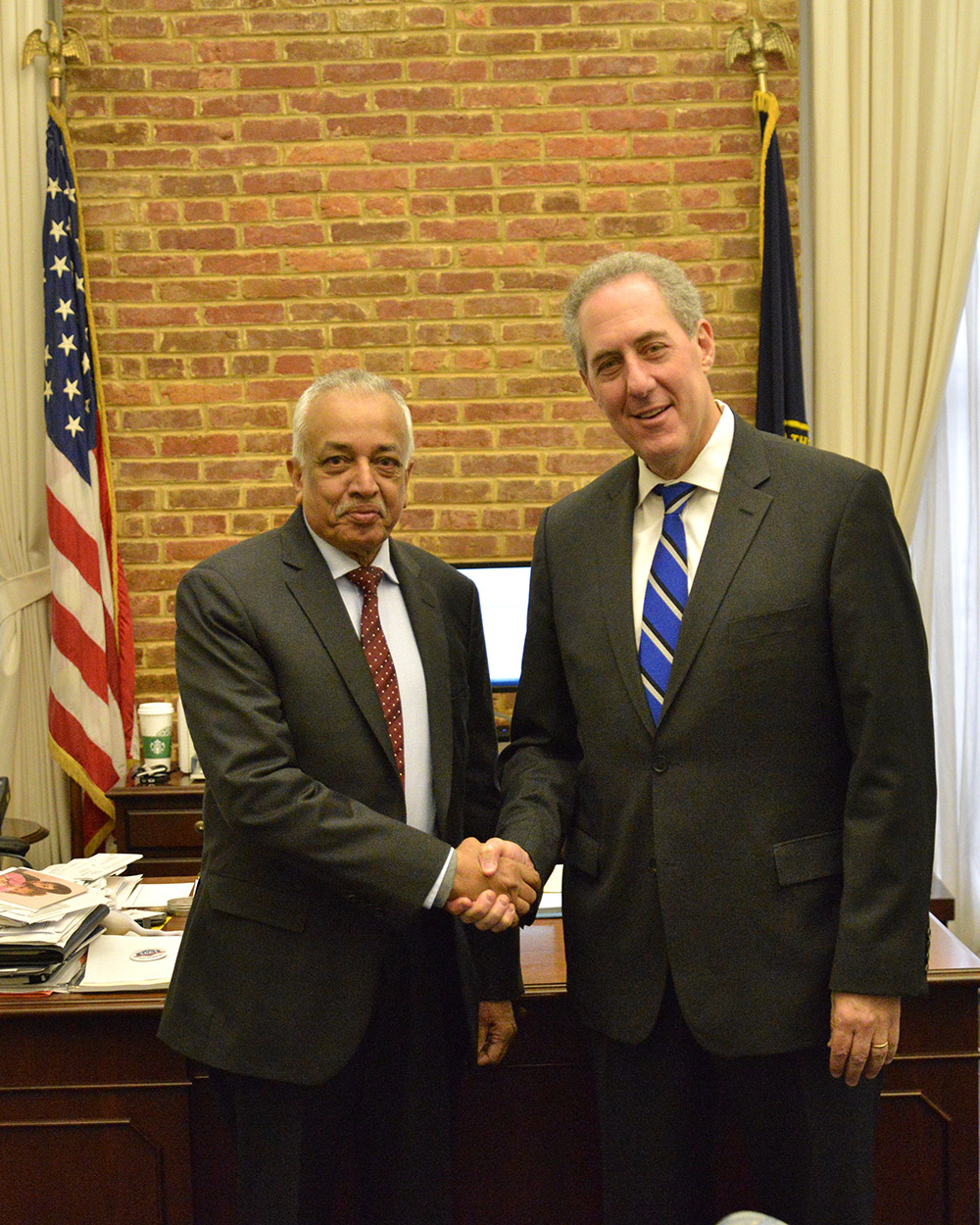
Minister Malik Samarawickrama meeting with the United States Trade Representative Ambassador Michael Froman
Minister of Development Strategies and International Trade Malik Samarawickrama led Sri Lanka delegation to the 12th US-Sri Lanka Trade and Investment Framework Agreement (TIFA) Council Meeting in Washington which adopted a path breaking Action Plan to boost bilateral trade and investment.

Minister Malik Samarawickrama meeting with the United States Trade Representative Ambassador Michael Froman
Minister of Development Strategies and International Trade Malik Samarawickrama led Sri Lanka delegation to the 12th US-Sri Lanka Trade and Investment Framework Agreement (TIFA) Council Meeting in Washington which adopted a path breaking Action Plan to boost bilateral trade and investment.
The Council meeting was Co-chaired by United States Trade Representative Michael Froman and Minister of Development Strategies and International Trade Malik Samarawickrama. United States Permanent Representative to the United Nations Ambassador Samantha Power participated as well, encouraging the Sri Lankan government to continue its vital progress on democracy, accountability, and human rights. Ambassador Froman noted that the election outcome has ushered in a new era of U.S.-Sri Lanka economic cooperation. Joint Statement issued at conclusion of the meeting is attached.
US Trade Representative Ambassador Michael Froman in his opening remarks stated that “it is our first significant opportunity for engagement on trade and investment issues since the Sri Lankan presidential election last year.” And he further stated “With the Joint Action Plan that we will announce today, we hope to set forth a series of concrete and specific initiatives to strengthen Sri Lanka’s trade and investment regime and mobilize more of the Sri Lankan population to participate in a trade-oriented economy.” (Full Statement attached).
Ambassador Samantha Power speaking at the Inaugural Session stated “As part of its determination to deal with abuses of the past, the (Sri Lanka) government had committed to justice and reconciliation processes which will serve all Sri Lankans. I have never seen a country take such swift strides in such little time.” And she emphasized that “The United States we will seek to leverage our assistance this year to further support broad-based economic growth.” (Full Statement attached).
Minister Malik Samarawickrama in his Inaugural Statement, among other issues, highlighted that “government is seeking to stabilize the economy and implement a development strategy that is capable of giving our people sustained accelerated growth and a million jobs in the next 5 years. We are determined to break out of the cycle of stop-go policies, which have characterized our past. For this, we need to create a sustainable growth framework.” And Minister highlighted that “increased market access for Sri Lankan exports will be crucial for building a more prosperous, stable and peaceful Sri Lanka.” (Full Statement attached below).
Ambassador Prasad Kariyawasam speaking at the Inaugural Session noted that “today is a landmark for TIFA process between our two countries, as we have representation at Cabinet-level from US side after long years. And in fact we have two officials of Cabinet rank from your side present, signaling no doubt, United States support for the ongoing transformation in Sri Lanka.” (Full Statement attached below).
At the conclusion of the meeting, both governments pledged their commitment to deepening their engagement over the coming months in order to develop a detailed implementation plan for the Action Plan, with formal launch envisaged later this year. (Joint Action Plan attached).
During his visit to Washington, Minister Malik Samarawickrama met with several US investors and addressed a Business Roundtable Discussion hosted by the US Chamber of Commerce. Minister also met with several members of US Congress, including Representative David Price, Representative Steve Chabot and Representative Joe Crowley.
Prior to the commencement of the US-Sri Lanka Trade and Investment Framework Council Meeting, Minister Malik Samarawickrama held a bilateral meeting with Ambassador Michael Froman, US Trade Representative at the Office of the US Trade Representative.
Delegation of Sri Lanka to the TIFA Council Session included :Minister of Development Strategies and International Trade Malik Samarawickrama , Ambassador for Sri Lanka to the USA Prasad Kariyawasam, Secretary to the Ministry of Labour and Trade Union Relations Gotabaya Jayaratne, Head – Agency for International Trade Saman Kelegama, Director General of Commerce Sonali Wijeratne, Director General of the Board of Investment of Sri Lanka Duminda Ariyasinghe, Senior Assistant Secretary of the Ministry of Labour and Trade Union Relations A. Wimalaweera, Asst. Legal Advisor of the Ministry of Foreign Affairs Tilani Silva and Minister/Commercial of the Embassy of Sri Lanka Bandula Somasiri.
Embassy of Sri Lanka
Washington DC
28 April 2016
---
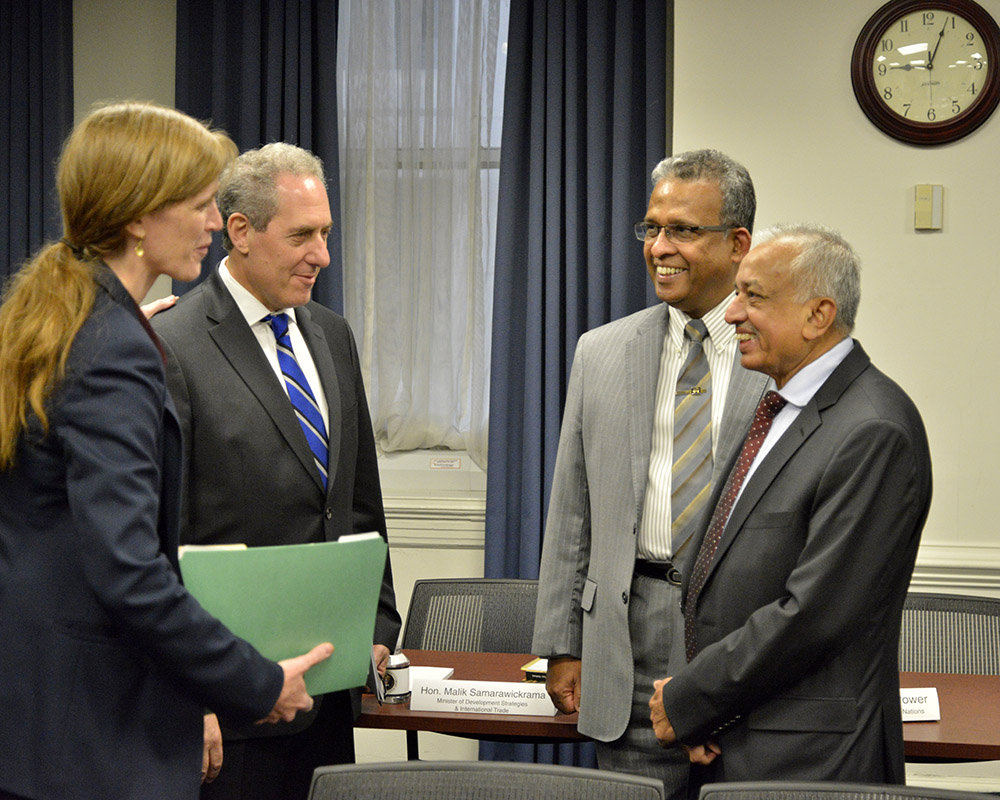
Minister Malik Samarawickrama meeting with Ambassador Michael Froman and Ambassador Samantha Power
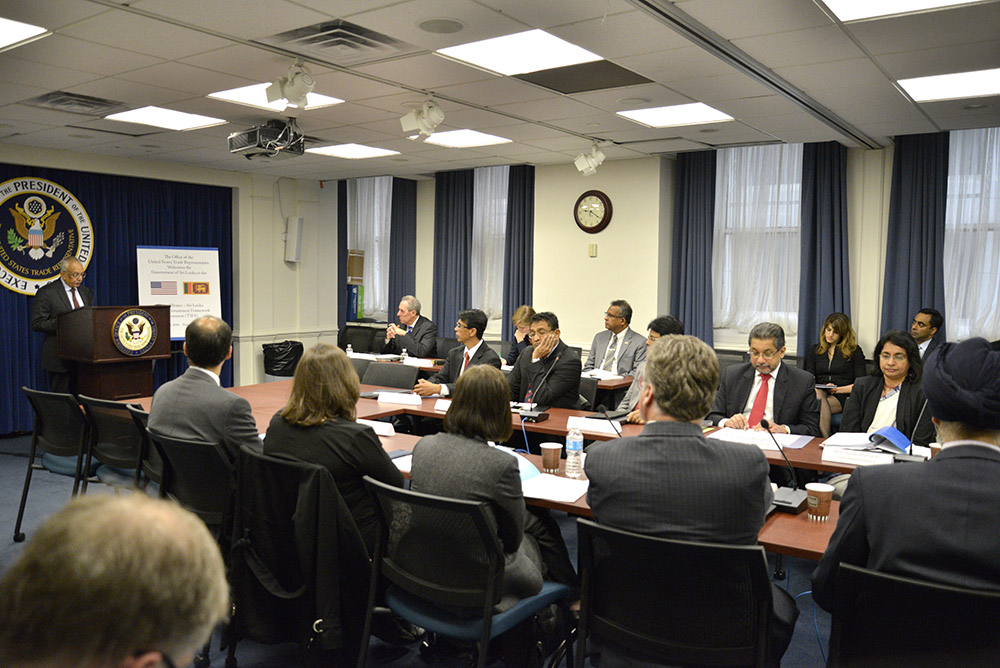
Minister Malik Samarawickrama speaking at the United States-Sri Lanka Trade and Investment Framework Council meeting
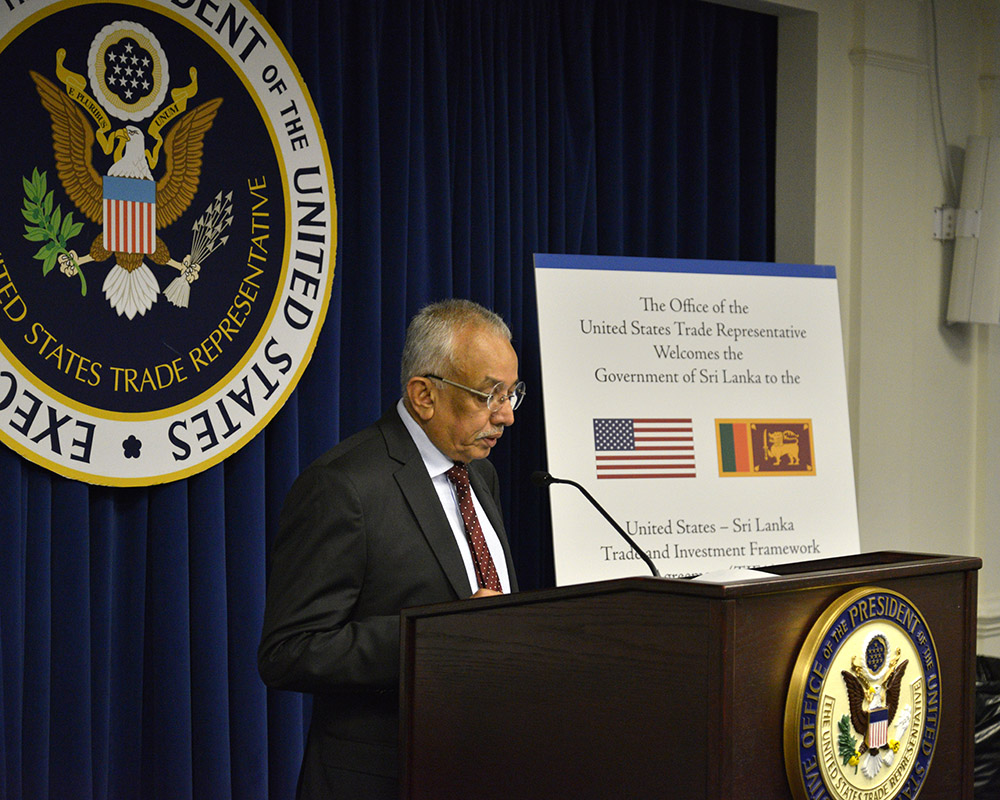
12TH JOINT COUNCIL MEETING UNDER THE US-SRI LANKA TRADE AND INVESTMENT FRAMEWORK AGREEMENT
STATEMENT BY HON. MALIK SAMARAWICKRAMA, MINISTER OF DEVELOPMENT STRATEGIES & INTERNATIONAL TRADE
28 April, 2016
It is a great pleasure to be here with you at the 12th Joint Council Meeting under the US-Sri Lanka Trade and Investment Framework Agreement.
Let me also express my sincere gratitude to Ambassador Michael Froman and Ambassador Samantha Power for their participation in these sessions. We greatly appreciate the trouble taken to be here personally despite the many competing claims on their time.
As is well known, our countries have had very productive bilateral relations over seven decades. The US continues to be Sri Lanka’s largest export market. The importance of this should not be underestimated for a country like Sri Lanka, which is small and highly trade dependent for promoting growth and shared prosperity.
Our bilateral relations have been multifaceted and have covered a range of activities.
The US is Sri Lanka’s largest export market. Let me know say that like Oliver Twist, the main theme of my remarks today is going to be about asking for ‘more’ market access.
Increased market access for Sri Lankan exports will be crucial for building a more prosperous, stable and peaceful Sri Lanka.
I hope our deliberations today will yield concrete outcomes, which give our exports increased access to the US market. This will also enable us to leverage the trade-investment nexus to attract much needed FDI flows.
I hope you will bear with me for a while as I seek to elaborate upon the case for using these talks to generate concrete outcomes which will give a rapid boost to Sri Lanka’s efforts to increase exports and FDI, the two key pillars of our private sector oriented development strategy.
As you are aware, major changes have been underway since the dramatic, peaceful and people-led political transition, which took place on 8th January, 2015.
The present Unity Government provides a cooperative framework for long overdue reforms.
A Constitutional Council has been appointed, which has established eight independent Commissions that are now functioning. The powers and capacity of the legislature are being increased with greater parliamentary scrutiny through Oversight Committees and the Parliamentary Budget Office; the independence of the judiciary is being reaffirmed; there is a free and vibrant press and media; and bribery and corruption are being combated based on the UN Convention against Corruption.
Our government has also initiated a process of constitutional reform, which includes nation-wide consultations. We are also in the process of putting in place a four-pronged approach to reconciliation and accountability to promote the healing process after the end of the conflict.
All this serves to revitalize Sri Lanka’s democratic credentials; improve governance; and strengthen the role of law. These are key elements of the platform, which brought our government into power. It is encouraging that progress is being made on these fronts. There are those who would want us to move faster. However, given the compulsions of coalition politics and the capacity constraints found in any developing country, I am firmly of the view that the direction is positive. We are making steady progress and we will continue to do so.
While all this is encouraging, the primary concern of the vast majority of our people is their material wellbeing. In their eyes, the dividends they expect from the 8th January, 2015 political transition is not confined to the gains I have just catalogued. They are also interested in a sustainable economic dividend. In fact, they are becoming impatient for it.
Here, the challenges are considerable. We inherited a legacy of unsustainable fiscal deficits and fragile debt dynamics. These constitute a very negative overhang on the country’s economic prospects.
In addition, global economic conditions have become more uncertain and difficult. The combined effects of a shift in the US Federal Reserve’s interest rate cycle; the uncertainty caused by the rebalancing of the Chinese economy; continued sluggish growth in Europe and Japan; the net outflow of funds from emerging markets; the elevated risks associated with Brexit and weak commodity prices have had an negative impact on many developing countries. Sri Lanka is no exception.
At this difficult time when global growth is being downgraded and international trade is sluggish, we are having to ask our people to tighten their belts to achieve fiscal consolidation, external account stability and increased external reserves, as well as to contain inflation.
As a lower-middle-income country, Sri Lanka has an expanding middle-class, which is impatient for an improvement in the living standards of their families.
It is in this context that our government is seeking to stabilize the economy and implement a development strategy that is capable of giving our people sustained accelerated growth and a million jobs in the next 5 years. We are determined to break out of the cycle of stop-go policies, which have characterized our past. For this, we need to create a sustainable growth framework.
In response to these challenges, we are putting in place a stabilization program, which will strengthen our macroeconomic fundamentals. We are confident that the IMF will support our efforts through an Extended Fund Facility. This will serve to attract other multilateral and bilateral support; as well as boost sentiment when we go to the international capital markets.
We have initiated a number of measures to improve the investment climate and strengthen trade facilitation.
The new government is committed to improving the overall investment environment in Sri Lanka to attract more foreign direct investment to the country. For this purpose, a number of initiatives have been put into operation.
The government has taken the initiative to establish an Agency for Development and an Agency for International Trade, in order to establish better coordination among government Agencies, Corporations and Departments, in order to expedite decision making.
The investment-trade nexus is being promoted by initiating a number of Free Trade Agreements (FTA) and Economic Partnership Agreements. The government will finalize an Economic and Technology Cooperation Agreement (ECTA) with India by the end of 2016 where the economic relations with India would be broadened by liberalization of services and investment between the two countries and deepened with further liberalization of goods trade now mostly governed by a FTA between the two countries. An FTA with China will come into effect by early 2017. With these two Agreements in place, Sri Lanka will be the second country in Asia after Singapore to have duty free market access to the two Asian giants. The government also plans to finalize Trade Agreements with Japan, Singapore and Turkey within the next 12 months.
The Cabinet of Ministers has approved the ratification of the WTO Trade Facilitation Agreement. This will be lodged formally at the WTO shortly.
I should also add that there are a number of major area development programs in the pipeline, which will transform the Sri Lankan economy.
The Western Region Megapolis Plan (WRMP), as well as the Hambantota, Jaffna, Kandy, Galle and Trincomalee District development programs will have a transformative impact on the lives of many Sri Lankans. We are working with the Chinese, Indians, Japanese, Singaporeans and the South Koreans to implement these programs, which will have a large equity component.
This will create opportunities for investors from all over the world, including the US.
I believe there is a strong case for being optimistic about the medium and long-term prospects of the Sri Lankan economy. However, a number of the projects and programs that are in the pipeline will have gestation periods of a few years.
It is important, therefore, to explore quick wins that can have an impact in the short-term. Here, I believe the US can be very helpful.
Our government greatly appreciates the support we have received from the US authorities.
Sri Lanka has been encouraged by the visit of US State Secretary Hon. John Kerry to Sri Lanka and other high level visits and the words of support received from the President of the United States and several members of the United States Congress as well. The first ever “Partnership Dialogue” held between the two countries last month signals the excellence in bilateral relations and high level of convergence between the United States and Sri Lanka in all aspects and in particular, support of the United States for peace building and political reform.
We also appreciate the fact that USAID is ramping up its operations in Sri Lanka. Its proposed programme to support the BOI is a very welcome development. In addition, the Millennium Challenge Corporation is working with us to explore the possibility of Sri Lanka becoming a ‘Compact’ country, which will open up significant amounts of grant financing.
I also hope USAID will give favourable consideration to our request for assistance for the Agency for Development, which will play an important role in coordinating and implementing the government’s priorities, policies and programmes.
However, the ‘Jewel in the Crown’, would be significantly increased preferential market access as this has the capacity to generate ‘quick wins.’ I would like to reiterate that we need to manage the short-term.
Sri Lankan exporters know how to operate in the US market. They would have the capacity to respond quickly to greater market access. In contrast, our initiatives to increase market access in China, India, Singapore, Turkey, etc., will have longer lead times before they yield benefits.
Let me now set out how I believe the US can assist us to achieve some ‘quick wins’.
The US already has special programs, such as the Qualifying Industrial Zones; the Special Programs for Haiti; the Africa Growth and Opportunity Act, as well as the Special Programs for the Caribbean and Andean countries.
Ambassador Froman, may I request your office, together with the State Department, to work with the US Congress towards establishing a similar program: a preferential trade programme for promoting reconciliation and consolidating democracy through trade in Sri Lanka.
While a special trade preference program is our immediate priority, we would also like to explore with you the development of a process, which would make it realistic for Sri Lanka to consider TPP membership further down the line. In my view, establishing a joint Working Group to examine the implications of TPP for Sri Lanka would be a good first step.
Sri Lanka has a negligible presence in global value chain. We are seeking assistance to improve the competitiveness of domestic enterprises to enable them to become part of global and regional production sharing arrangements.
While opening up the economy, our government is also seeking assistance to build capacity in trade policy enforcement to ensure that Sri Lankan producers and workers have a level playing field to compete in an increasingly outward looking economy.
Our government is attaching high priority to upgrading SMEs to enable them to participate in international trade as an important means of promoting inclusive development. In this connection, there seems to be merit in establishing a US-Sri Lanka Partnership for access to credit through which USAID, in partnership with local banks, can make credit available for SMEs.
May I also suggest that we consider how we can work together in the area of tertiary education, training and skills development. Our government is attaching high priority to empowering our people to take advantage of opportunities that would arise in an increasingly competitive and rapidly modernizing economy.
Digitalization is also receiving close attention across government. The US is clearly very well positioned to support a national strategy for delivering basic services, improving citizens’ life styles and promoting e-commerce.
Our agenda today also includes a number of other items. Many of them came up during last month’s ‘Partnership Dialogue’. I hope we can get favourable outcomes in these areas as well. Our Mission in Washington will follow-up with the relevant authorities. As our government continues with its private sector-led development strategy, it will become even more important for the business associations in our two countries to establish closer links. In this connection, it would be useful to set up a US-Sri Lanka working group within the US Chamber of Commerce.
Before I conclude, I would like to raise another avenue, which we would like to pursue vigorously, Sri Lanka has just ratified the Paris Declaration. This opens up opportunities under COP 21. We would like to see how best we can take advantage of these alongside facilities available through OPIC.
Finally, Sri Lanka is on the cusp of a transformative leap forward. However, there is much to be done and we require the goodwill and assistance of our friends like the USA. We look forward to working very closely with you Ambassador Froman, and your office, Ambassador Samantha Power, the State Department, USAID and other US government agencies as well as Congress as we pursue our reform-oriented goals.
---
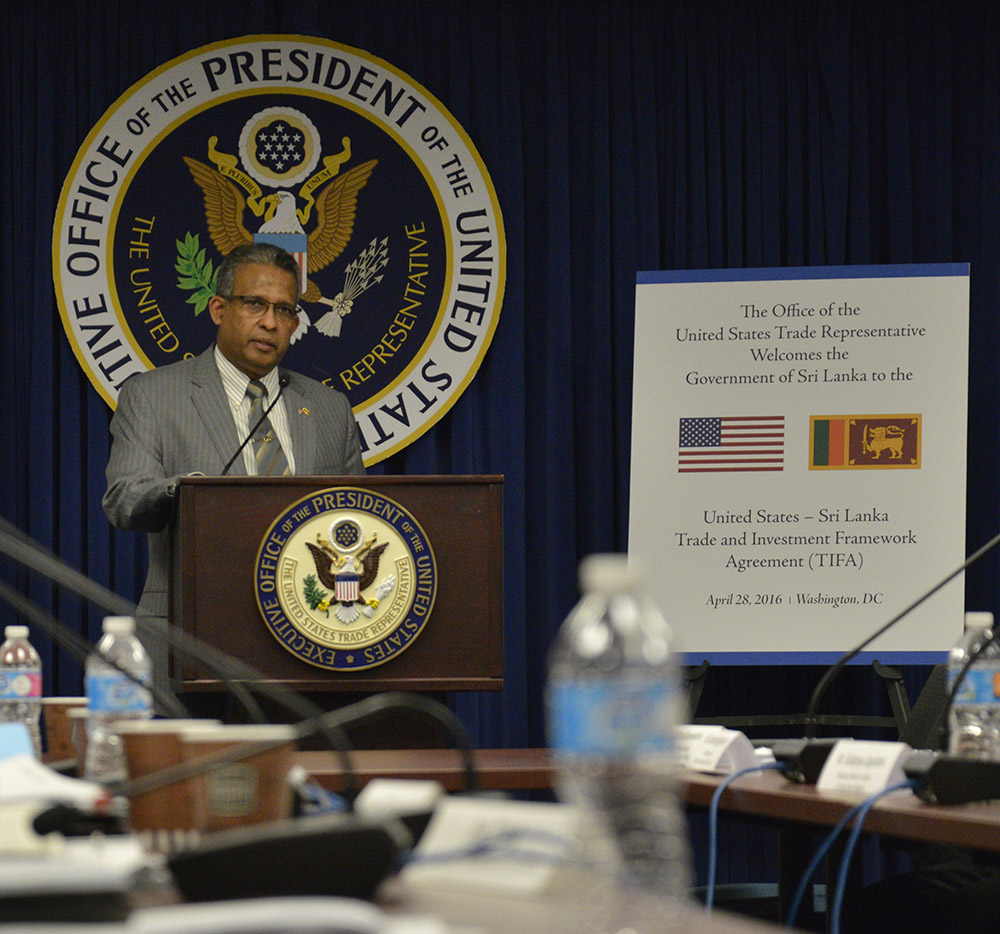
REMARKS BY H.E. PRASAD KARIYAWASAM, AMBASSADOR FOR SRI LANKA
AT THE INAUGURATION OF THE 12TH JOINT COUNCIL MEETING UNDER THE US-SRI LANKA TRADE AND INVESTMENT FRAMEWORK AGREEMENT
28 April, 2016
Let me first thank Ambassador Froman for his gracious presence. And we are indeed honored and encouraged by the presence of Ambassador Samantha Power.
Today is in fact a landmark for TIFA process between our two countries, as we have representation at Cabinet-level from US side after long years. And in fact we have two officials of Cabinet rank from your side present, signaling no doubt, United States support for the ongoing transformation in Sri Lanka.
This is also the first meeting of TIFA after the Presidential and Parliamentary Elections in January and in August last year in Sri Lanka, and the formation of the National Unity Government under the leadership of President Maithripala Sirisena and Prime Minister Ranil Wickremesinghe.
In this context, I would like to complement the words of Hon. Minister Samarawickrama, by briefly recalling events and actions in Sri Lanka that underpin the Government’s desire to deepen and broaden the economic content of our relationship with the United States.
At the Presidential Election in January 2015 and the Parliamentary Election in August 2015, the people of Sri Lanka voted for change. They voted for good governance, rule of law, strengthening human rights, freedom of expression and reconciliation. They also voted for an end to divisive politics, and an end to impunity, and in support of the formation of a National Unity Government to ensure policy stability. Sri Lanka has since been making steady progress in all these fronts.
Soon after the Presidential Election in January, Sri Lanka started reaching out to the world. This included the United States of America with whom relations were at a low ebb during the period following the end of the conflict in May 2009.
The progressive policies of the Government including the passage of the 19th Amendment to the Constitution, and its implementation, enabled bilateral relations between Sri Lanka and the US to be revived, based on common values including democracy and respect for the rights of citizens.
Recognizing the need for reconciliation, justice and accountability, and the importance of these steps to achieve a durable peace and long-term economic progress and development, Sri Lanka, manifesting her new approach to human rights, co-sponsored the Resolution on Sri Lanka that was tabled at the 30th Session of the UN Human Rights Council by the United States, last October.
The visit of US Secretary of State John Kerry to Sri Lanka a year ago in May 2015 was yet another landmark in our relations. A US Secretary of State visited Sri Lanka after 43 long years, and it was indeed an honour for the people of Sri Lanka to receive him.
The outcome of the first ever US-Sri Lanka Partnership Dialogue in February this year serves as the platform on which the Partnership between our two countries would be strengthened and built, over time.
The transformation agenda that the Government has undertaken is both ambitious and challenging. The people of our country, like the people of most countries, are impatient as they look for quick results and the receipt of a tangible economic peace dividend. Development and Peacebuilding are intertwined; and the Government needs the continuous and sustained support of the people to carry out economic, political and administrative reforms. The same holds true for the process of reconciliation involving truth, justice, reparations and non-recurrence and the process of drafting and adopting the new Constitution which is central to the process of reconciliation.
Young people seek training and skills required for employment. They seek quality education and jobs that would enable them to live decent lives; children require new and better schools with modern facilities; the old require hospitals and medical care at affordable cost; the displaced require quick resettlement with infrastructure facilities in place; the large number of female headed households require special attention; those affected by conflict require psycho-social and livelihood support. While the Government grapples with all this and more, there are also the adverse effects of climate change that Sri Lanka grapples with – unprecedented heat, drought, unseasonal rains and floods – which adversely affects communities, agriculture and power generation.
The Government is committed to face all these challenges.
However, we cannot achieve success on our own without the assistance of our international partners. This is where we look to our traditional friends like the United States for assistance in the form of special opportunities for more trade and more investment to kick-start our economy, especially in regions affected by conflict and those afflicted by endemic poverty.
We look forward to work together to achieve this goal, in the short, medium and long-term.

